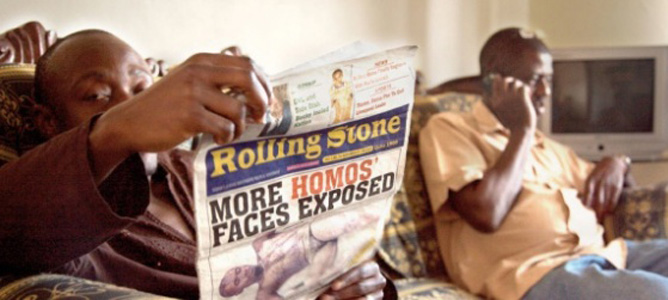Showing @ Filmhouse, Edinburgh, Fri 5 Oct only
Katherine Fairfax Wright, Malika Zouhali-Worrall / USA/Uganda / 2012 / 87 min
Since the end of 2009, LGBTI activists in Uganda have fought against the proposed Anti-Homosexuality Bill, which is the latest attempt by the government to intensify the criminalisation of homosexuality. Simply knowing a gay person and not reporting them within 24 hours of ‘finding out’ carries a three year prison sentence, being ‘outed’ can result in life imprisonment, while ‘aggravated homosexuality’ (which includes ‘repeat offending’) is punishable by death.
The upheaval facing members of the gay community is one snarled in decades of religious hatred and violence, government oppression, mob justice, church demonisation and media targeting. Katherine Fairfax Wright and Malika Zouhali-Worrall’s Call Me Kuchu, which won Best Documentary in Berlinale’s ‘Teddy Awards’, is a product of that upheaval. It follows activists battling against the courts and press to overturn and repeal laws that threaten the lives of Ugandans, including campaigner David Kato, who was murdered in 2011 following lawsuit success against Kampalan newspaper, Rolling Stone.
The tragedy of this documentary travels deep to the heart of human rights. It illuminates the dark corners of homophobia which have swelled in Uganda since the introduction of Evangelicalism and intervention of the West, documenting how much hate has pervaded and divided the country. Today’s condition is one where the raping of gay women is seen as curative, homes are likely to be raided by “journalists” and families isolate themselves for fear of arrest. People like Kato face daily confrontations with anti-homosexuality supporters and are slowly being ‘forced back into the closet’.
Call Me Kuchu (which takes its name from the Ugandan slang term for members of the LGBT community) is so gut-wrenchingly exigent, it makes many other matters seem trivial; it must stay atop the UN agenda and avoid being squeezed out by other international concerns. Perhaps the film’s directors could have interviewed political officials and activists outside of Uganda to offer an even more rounded view of the situation. But it is a film which insists on us to learn more about the individuals who are campaigning for sexual freedom, empowers us to get involved and show solidarity, and demonstrates how belief systems can generate horrifyingly archaic principles. Watch this film, tell everyone you know and join the fight. To quote the film’s mantra: A luta continua.


One thought on “Call Me Kuchu”